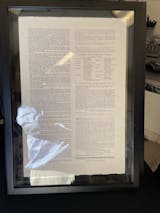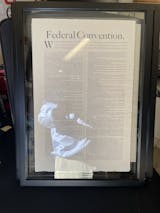The History List
"United States Constitution" from the Printing Office of Edes & Gill in Boston - Pre-ratification, with letter from George Washington
"United States Constitution" from the Printing Office of Edes & Gill in Boston - Pre-ratification, with letter from George Washington
Couldn't load pickup availability

This broadside, as printed in Boston before ratification in Massachusetts, with the Constitution and a letter from Washington urging ratification was found after a five-year search of the state archives by master printer Gary Gregory.
It is an extraordinary print for anyone who is deeply interested in our country's history. The letter from Washington, included at the end of the broadside, is a reasoned appeal for compromise and ultimately adoption. See below for additional historical background.
The print is from the Printing Office of Edes & Gill located in the Clough House (c 1715) on the grounds of the Old North Church Historic Site in Boston.
This video was shot at the Printing Office of Edes & Gill the day they began printing the Boston edition of the United States Constitution. In the video, Gary Gregory, founder and print master, describes the five year effort to print this for the first time since 1787.
The original broadside was printed on both sides of a sheet.
We offer them in two sizes: On one two sheets, each 11 1/2" x 17 1/2", and on a single sheet that is 23 " x 17".
As was the case with the original broadsides, there is variability in ink coverage. To get a better idea of why some of these differences occur, watch the video above.
We also have the Boston broadside of the "Declaration of Independence," printed by Edes & Gill. You can purchase the Constitution, described above, or the Constitution and the Declaration, which is also printed at Edes & Gill, at a savings of $5 for the pair.
, as well as the Philadelphia broadside, printed by John Dunlap, and the Baltimore broadside printed by Mary Katherine Goddard.
— Lee Wright | Founder | The History List | History Camp
The text of Washington's letter
In convention, September 17, 1787
"We have now the Honor to submit to the Consideration of the United States in Congress assembled that Constitution which has appeared to us the most advisable. The Friends of our Country have long seen and desired that the Power of making War Peace and Treaties, that of levying Money & regulating Commerce and the correspondent executive and judicial Authorities should be fully and effectually vested in the general Government of the Union. But the Impropriety of delegating such extensive Trust to one Body of Men is evident—Hence results the Necessity of a different Organization.
"It is obviously impracticable in the fœderal Government Of these States to secure all Rights of independent Sovereignty to each and yet provide for the Interest and Safety of all—Individuals entering into Society must give up a Share of Liberty to preserve the Rest. The Magnitude of the Sacrifice must depend as well on Situations and Circumstances as on the Object to be obtained. It is at all Times difficult to draw with Precision the Lines between those Rights which must be surrendered and those which may be reserved⟨.⟩ And on the present Occasion this Difficulty was encreased by a Difference among the several States as to their Situation Extent Habits and particular Interests.
"In all our Deliberations on this Subject we kept steadily in our View that which appears to us the greatest Interest of every true american the Consolidation of our Union in which is involved our Prosperity Felicity Safety perhaps our national Existence. this important Consideration seriously and deeply impressed on our Minds led each State in the Convention to be less rigid on Points of inferior Magnitude than might have been otherwise expected. And thus the Constitution which we now present is the Result of a Spirit of Amity and of that mutual Deference & Concession which the Peculiarity of our political Situation rendered indispensible.
"That it will meet the full and entire Approbation of every State is not perhaps to be expected. But each will doubtless consider that had her Interests been alone consulted the Consequences might have been particularly disagreable or injurious to others. That it is liable to as few Exceptions as could reasonably have been expected we hope and believe That it may promote the lasting Welfare of that Country so dear to us all and secure her Freedom and Happiness is our most ardent wish."
This transcription is from the National Archives, which has additional notes explaining the letter.
About the Massachusetts Ratifying Convention
The letter from Washington is dated September 17, 1987. The state conventional met a few months later, as explained in this article from the Massachusetts Society Sons of the American Revolution:
"The Massachusetts Ratifying Convention met in Boston from January 9, 1788 to February 5, 1788 to discuss 'the adoption of the federal Constitution.' 370 delegates had been elected on October 25, 1787, and when the final vote was taken on February 3, 355 registered their vote."
The Center for the Study of the Constitution provides additional historical context:
"The importance of Washington’s letter of 17 September 1787 as president of the Convention to the president of Congress cannot be over emphasized. This letter (written by Gouverneur Morris but signed by Washington) was attached to the Constitution whenever it was printed. The letter stated 'the Constitution, which we now present, is the result of a spirit of amity and of that mutual deference and concession which the peculiarity of our political situation rendered indispensable.' With Washington supporting the Constitution, it was difficult for Antifederalists to explain why they opposed ratification.
"In private correspondence, Washington left little room for speculation. In his letters he expressed a desire to see the Constitution adopted even though (like all Federalists) he acknowledged that it had some imperfections. He praised the amendment provision that provided a viable method of correcting problems that might become apparent after the Constitution was implemented. Occasionally, when his correspondence was published without his approval, Federalists and Antifederalists used the materials as fodder for their causes. The former suggesting that if a virtuous figure like Washington was supportive of the Constitution, ratification of the plan was essential. Antifederalists lamented that since Washington was not an experienced legislator, he had been duped by cunning politicians bent on adopting a dangerous form of government."
Read the article here.
About Benjamin Edes & John Gill
On April 7, 1755, Edes and Gill became the proprietors of The Boston Gazette and Country Journal. According to the author of Infamous Scribblers (2006), the Boston Gazette, arguably the most influential newspaper the country has ever known, got us into the Revolutionary War, sped up the course of the war and may have even determined the outcome of the war.
Shipping
Shipping
Free standard domestic shipping on orders of $75 or more
Just add items to your cart totaling $75 or more (before tax and after discounts), and the shipping fee will be removed. No discount code needed.
This applies to most items, including shirts, caps, sweatshirts, unframed prints and posters, bracelets, lapel pins, pendants, blankets, and other qualifying items.
For orders below $75
Flat-rate shipping: Regardless of the number of items you order, the shipping price for shirts, caps, unframed prints and posters, bracelets, lapel pins, pendants, and button packs is $5.95.
For hooded and crewneck sweatshirts, mugs, and blankets, the shipping cost is $8.95.
Our flat rate shipping means you can add two or more t-shirts, sweatshirts, or caps for no additional shipping charge.
Learn more about shipping here.
All original designs are copyrighted by The History List
All original designs are copyrighted by The History List
All designs are copyrighted by The History List and the History Nerd text and design on t-shirts is a registered trademark. If you see a knock off, please let me know.
Made by America
Made by America
Almost all of the new products we offer are designed by us and made in America and most of our Rare Finds were made in America.
Our original designs are based on our nation’s history and our love of American history. Read more about other things we've created, including The History List, History Camp, and The Pursuit of History, in addition to The History List Store.
All original designs are copyrighted by The History List.
Every product that is made in America states that in the product description and includes the "Made in U.S.A." graphic. There are a relatively small number of items where we’ve not been able to find a manufacturing partner here in the States, but we continue to look.
Our nation’s history—Our original designs
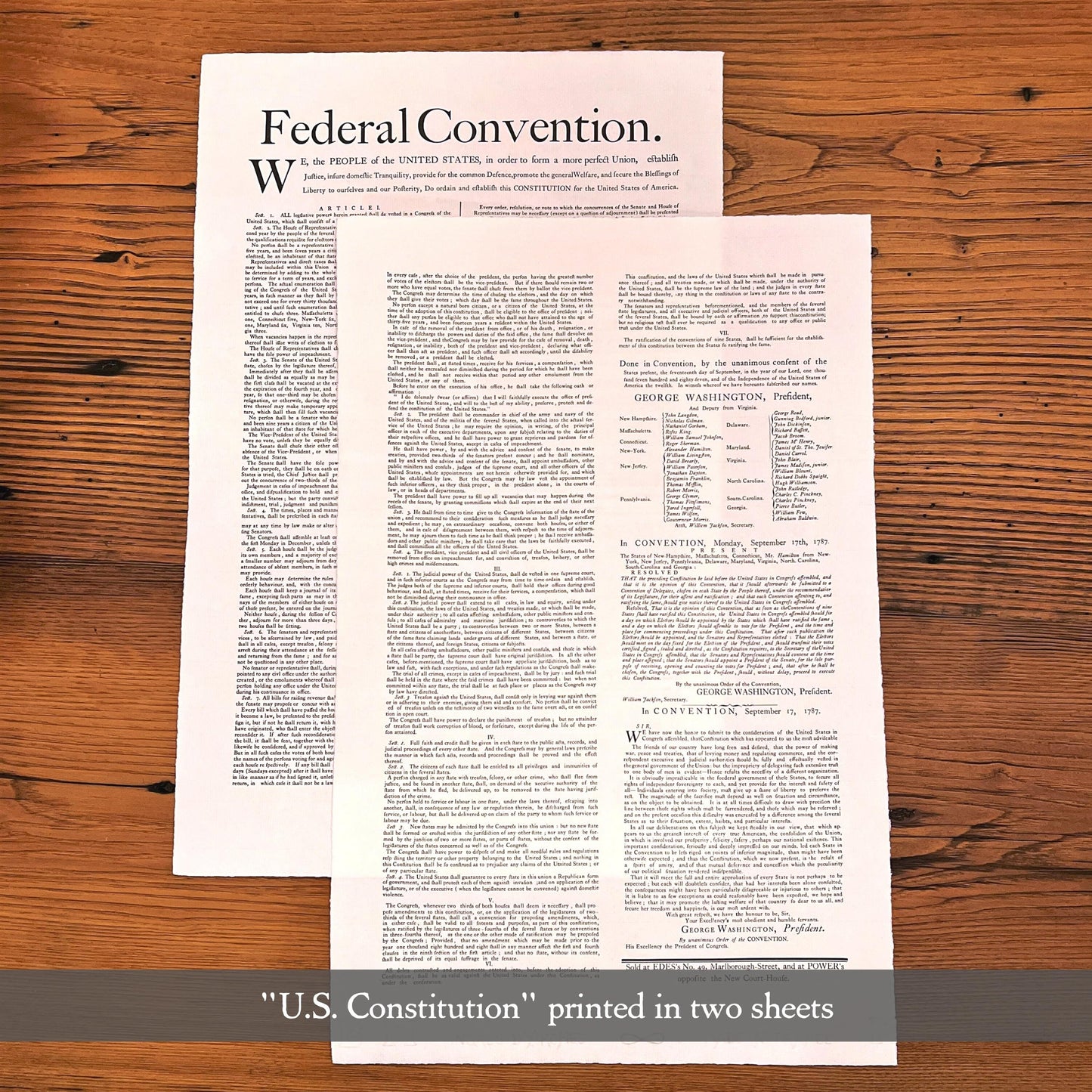
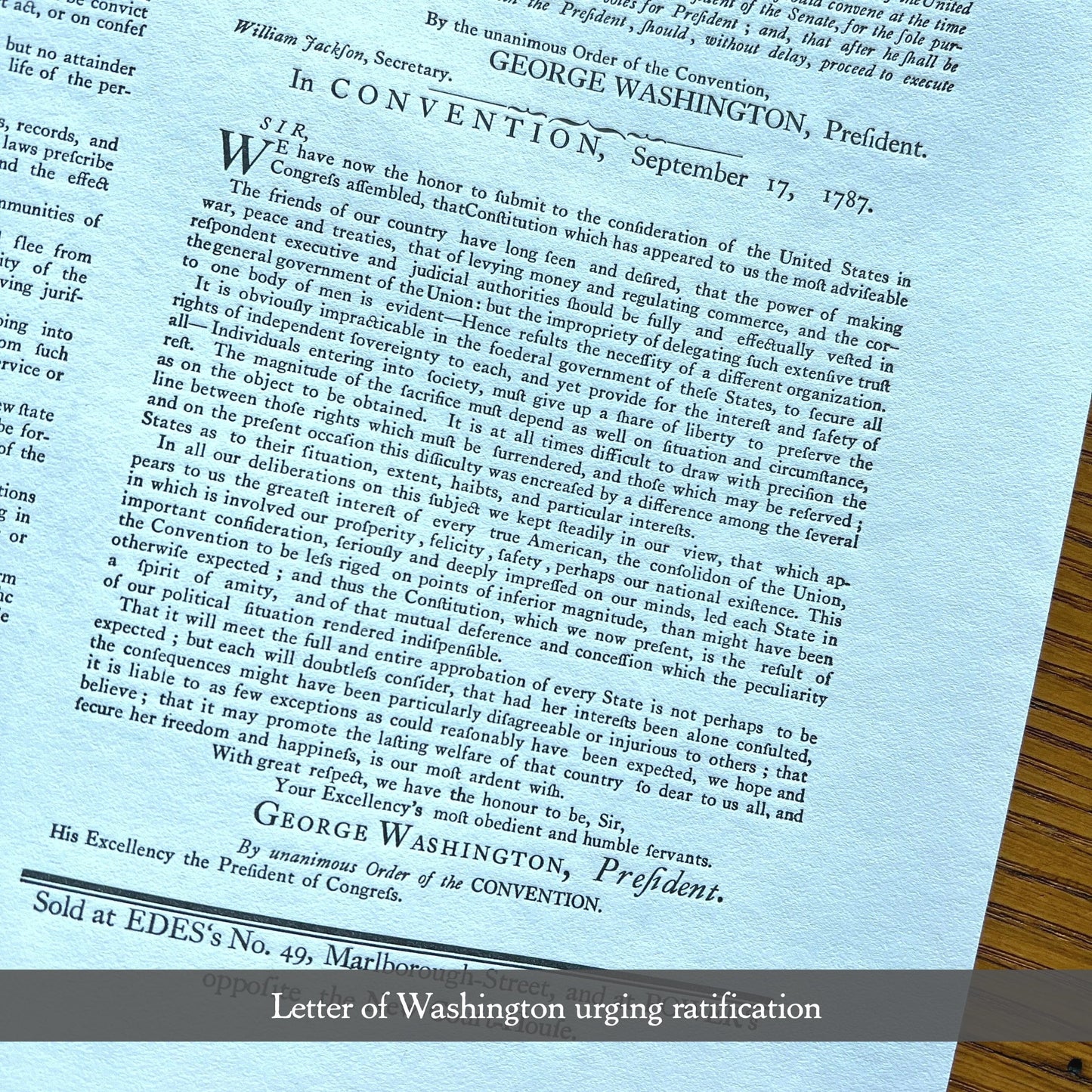
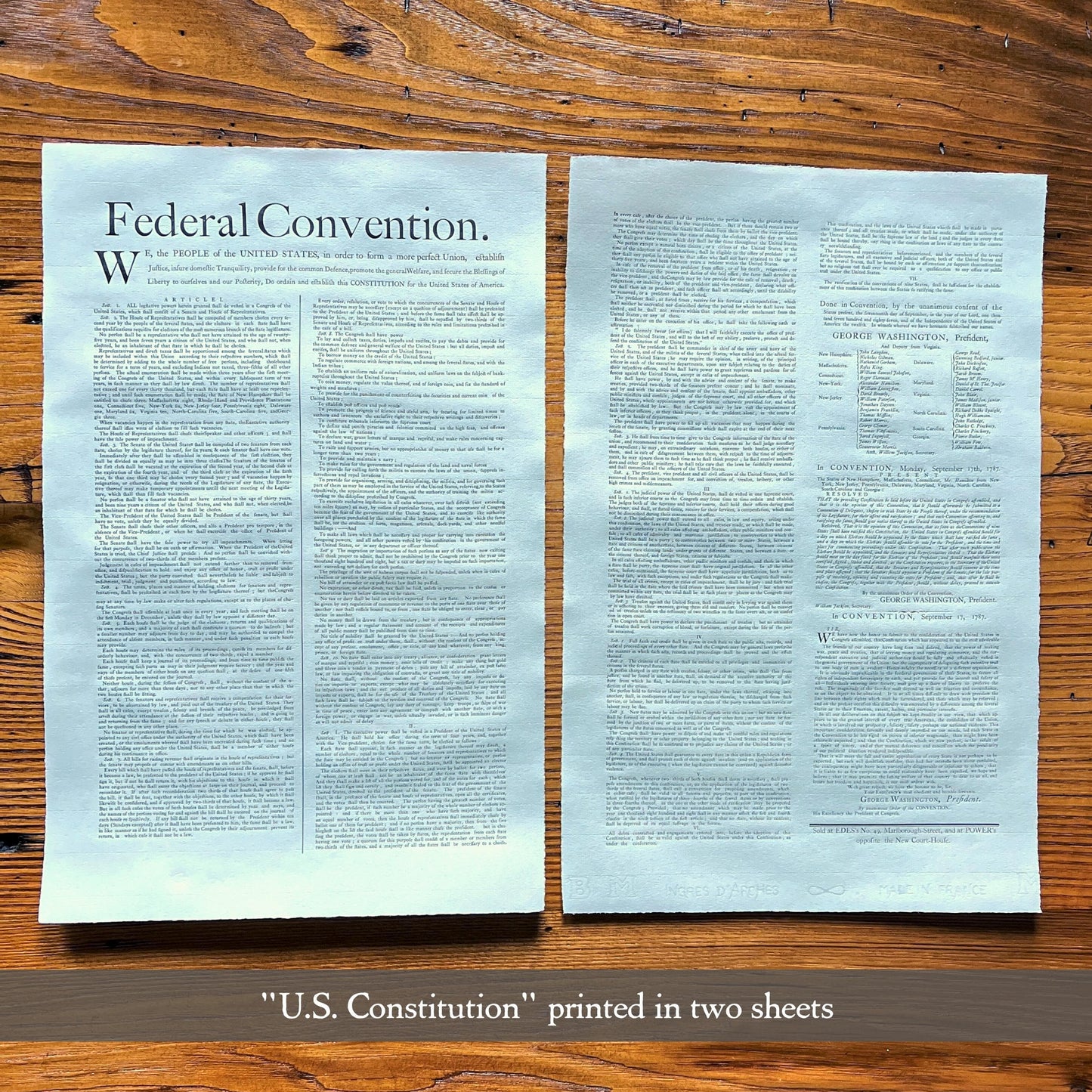
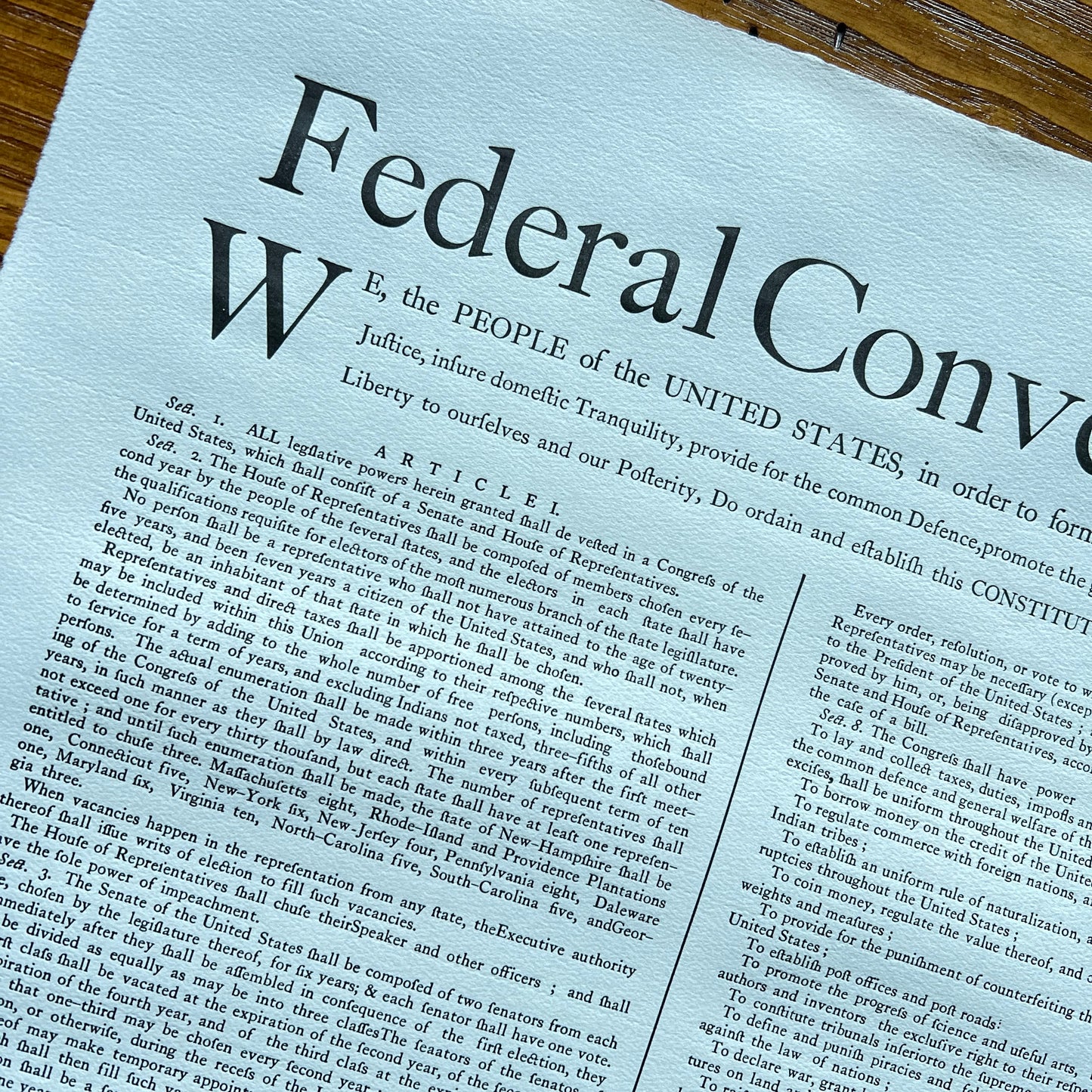
This wonderful document was hand printed with a historical letter press, authentic ink, and on archival quality paper. The physical impression of the letters onto the paper left very fine depressions on the paper that gives an air of the old world art of printing. The result is a highly readable copy of the Constitution that I will have nicely framed for presentation in my home library. Excellent quality and a wonderful value. Thank you!
I bough this piece twice. The original one I had hanging framed in my office my brother admired and I gave it to him as well as the bill of rights for the holidays as he is a second year law student. He was speechless and loved it. I have this copy hanging in my home next to a copy of the Declaration of Independence. I love the way they used the spelling and printing of the time and the paper as well. This is a beautiful piece and any history buff big or small should have this in their collection
This is a great high-quality replica of the U S Constitution as it was sent to the states for ratification, printed in Boston. I purchased this along with the Declaration of Independence and was not disappointed. Fast shipping!!
Excellent quality paper and printing, rapid shipping, and most importantly well packaged.
Will hang prominently next the the Declaration in our living room.
Thanks Lee, for outstanding work.
I ordered both the Constitution and Declaration of Independence and I love them both. Great quality and fast shipping. I would definitely recommend this to anyone.
I received the Declaration and the Constitution a few days ago. Superb quality, and I love the manner in which these documents of our Republic were printed. A real link to the past in a meaningful way. Thank you.
Received my order the other day and unfortunately it came damaged in shipping. Sent Lee an e mail suggesting a tube might be a solution and told him I would try to remove the wrinkles and not to send a replacement. It took no time for Lee to respond and inform me that he would send another copy even though I asked him not to and asked if I could donate the item to a local school.
Outstanding service Thank you Lee
I am very satisfied with my purchase. It’s both informative and displayable. I would highly recommend this item to anyone with an interest in American history.





